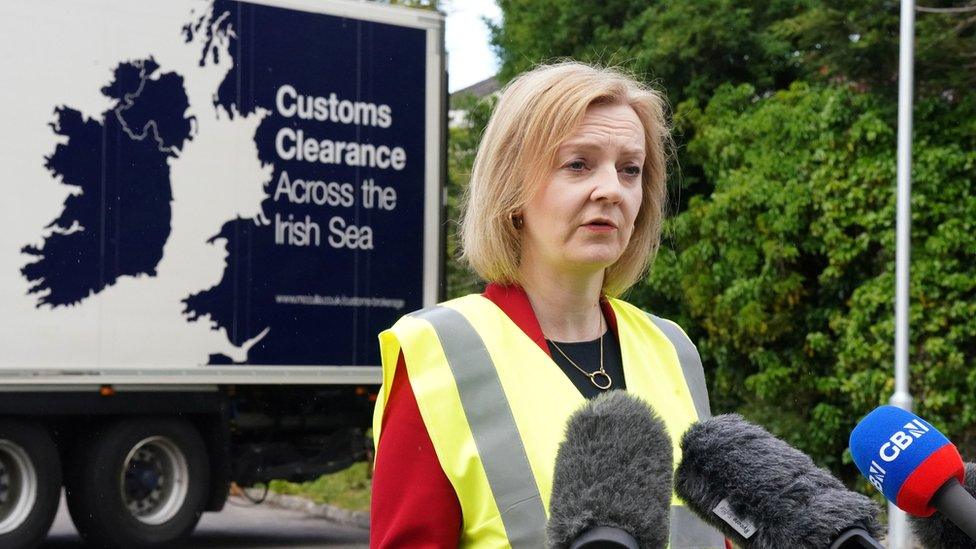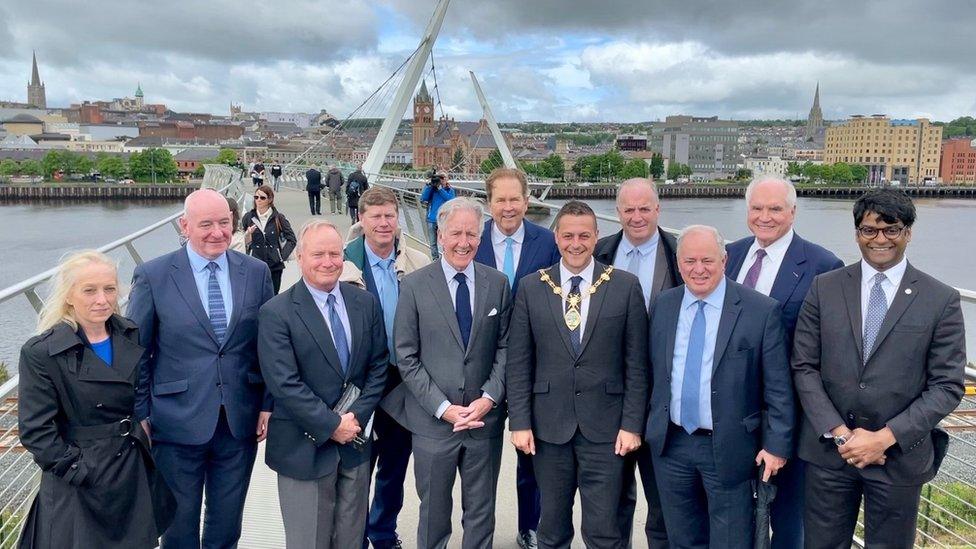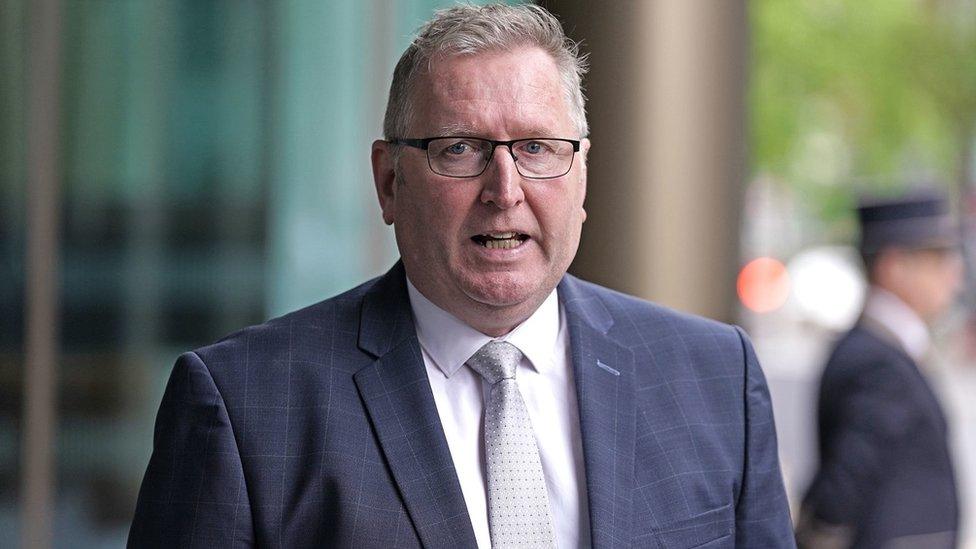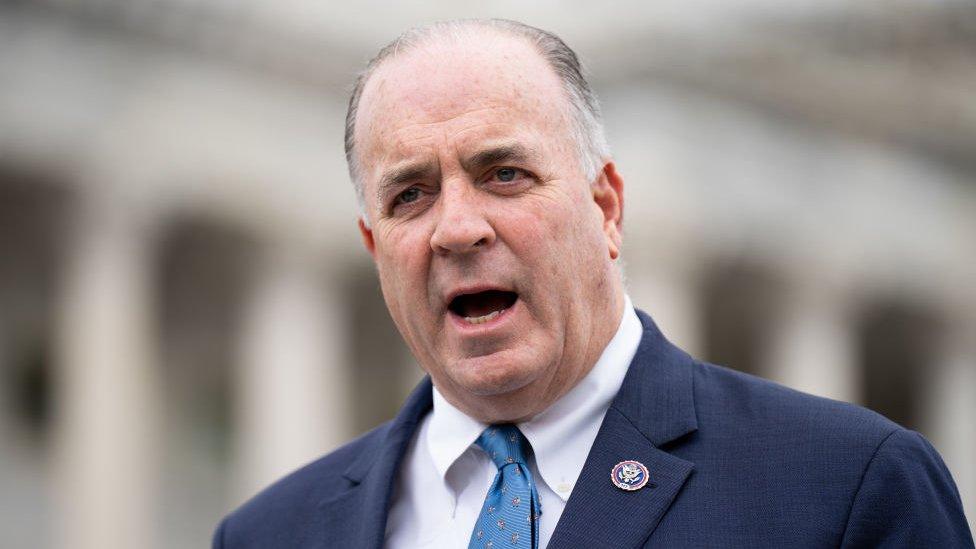NI Protocol issues fixable but cannot drift, says Liz Truss
- Published

Issues with the Northern Ireland Protocol are "soluble" but cannot be allowed to drift, Foreign Secretary Liz Truss has said.
Her comments came when visiting firms in County Antrim about government plans to manage the trade arrangements.
A row over the protocol's impact has prevented the formation of a devolved government at Stormont.
While Mrs Truss was in County Antrim, a US political delegation is visiting Londonderry over the protocol standoff.
They were urged to be careful with their words by the city's mayor, Graham Warke, after Democrat Richard Neal angered unionists on Tuesday by saying the dispute over the protocol appeared to be manufactured.

DUP Mayor of Derry Graham Warke said the US visitors were very welcome but asked if they "could be careful with their words"
Northern Ireland Secretary Brandon Lewis also met members of the delegation on Wednesday evening.
Speaking before the meeting, he said he would stress the UK government's "firm" preference for resolution was for a negotiated solution with the EU.
'Fix the issues'
Last week, Number 10 announced it would introduce a law to change the post-Brexit trade deal for Northern Ireland.
But Mrs Truss said her preference remains a negotiated outcome with the EU.
The protocol is part of the UK's Brexit deal with the EU to ensure the continuation of free trade across the Irish land border.
It does this by keeping Northern Ireland aligned with the EU single market for goods.
However, this has resulted in additional checks being placed on some goods moving between Great Britain and Northern Ireland.
Unionists have argued this has undermined Northern Ireland's place in the UK, with the Democratic Unionist Party (DUP) blocking the establishment of Northern Ireland's assembly and executive in protest.

The basics
The Northern Ireland Protocol is part of the Brexit deal: it means lorries don't face checkpoints when they go from Northern Ireland (in the UK) to the Republic of Ireland (in the EU)
Instead, when goods arrive in Northern Ireland from the rest of the UK (England, Scotland and Wales), they are checked against EU rules
The UK and the EU chose this arrangement because the Irish border is a sensitive issue due to Northern Ireland's troubled political history
Read more: Guide to the Brexit border problem

Speaking in County Antrim, Mrs Truss said "everybody in Northern Ireland recognises" there are issues that need to be addressed with the protocol.
"We're not talking about scrapping it - we want to fix the issues but we simply can't allow the situation to drift," she added.
"We need to get the executive at Stormont back up and running.
"What we've been clear about is that the protocol is causing political instability."
Criticism of 'derogatory language'
Meanwhile, Richard Neal, who is leading the US congress delegation in Derry, drew criticism from the DUP, Ulster Unionist Party (UUP) and Traditional Unionist Voice (TUV) party after he said the dispute over the protocol appeared to be "manufactured".
Another comment by Mr Neal referring to the "planter" and the "Gael" was described as disappointing by UUP leader Doug Beattie.
He told BBC Radio Ulster's Nolan Show that he was both Irish and British, and "no planter".
"He (Mr Neal) needs to understand that that terminology alone is derogatory to many people like me."

Ulster Unionist Party leader Doug Beattie
Mr Beattie added that he did not believe Mr Neal's views on the protocol were shared by the US government.
At a reception on the delegation's first day in Northern Ireland, the DUP Mayor of Derry Graham Warke told the US visitors were very welcome but asked if they "could be careful with their words".
Speaking on Wednesday, Mr Neal explained: "I was using the historic reference, as the mayor noted today, about the establishment of the plantation, that was the point that I made.
"I also referenced the historical term of the Gael, the Gael and the planter, because those are entirely accurate historic references."
Asked about the issues on the protocol, he stated: "Compared to the issues that the two communities here have faced, it is significantly disproportionate. The people here took up much more severe challenges.
"We believe that based on the conversations that we had in Brussels, in London, this is an issue for the European Union and for the UK government to sift and sort."
Related topics
- Published2 February 2024

- Published23 May 2022
